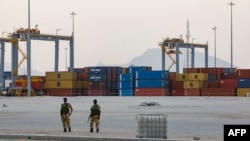Ethiopia and Somaliland inked the deal on January 1, which prompted rebuke from Somalia. At the time, Redwan Hussien, National Security Advisor to the Prime Minister of Ethiopia said the deal also "paves the way for accessing a leased military base on [the] Red Sea."
Somaliland officials said under the deal, Ethiopia will recognize the self-declared republic as an independent country. Ethiopia is yet to explicitly confirm it will grant recognition to Somaliland. Somalia, which considers Somaliland as part of its territory, said the deal violates the sovereignty and territorial integrity of the country.
John Kirby, director of strategic communications for the National Security Council, told VOA that Washington was working with partners in the region — including the African Union and the eight-member Intergovernmental Authority on Development trade bloc — to push against the non-binding memorandum of understanding, which Somalia's government, headquartered in Mogadishu, sees as illegitimate.
"We're certainly troubled," Kirby said, adding: "As we've said many, many times, we support Somalia's sovereignty, their territorial integrity, and it's got to be respected."
Situation could embolden militants, says official
Somaliland, the fragile nation's breakaway province, has enjoyed stability and organized multiple popular elections. It has sought recognition since 1991, but the African Union's official policy opposes changes to colonially drawn borders.
The situation poses a national security concern for Somalia, Kirby said, in that it could embolden Islamist al-Shabab militants that have long been the main antagonist in Somalia's brutal civil war.
"What we're particularly concerned about is this [Memorandum of Understanding] inked recently between Ethiopia and Somaliland threatens to disrupt the fight that Somalis, Africans and regional, international partners, including us, are waging against al-Shabab," he said. "Al-Shabab remains a viable terrorist threat in the region, without question. We don't believe that the region can afford any more conflict."
"It's a dangerous path," Somalia's former foreign minister and former ambassador to the U.S., Ahmed Isse Awad, told VOA. "The sister nations have gone to war twice in the last 50 years.
"We thought we recovered from that conflict and bad history," he added, speaking to VOA from the northeastern city of Garowe. "And as of late, we were working towards a great Horn of Africa cooperation and openness to each other. But now, this misguided step by Ethiopia endangers all of that and takes us back to the days of conflict and violent confrontation. It risks the whole region and the security of the region."
And, he said, while the U.S., "had a respected voice in the international arena," its staunch support of Israel has changed that.
"They don't have the same leverage, I feel, because of the way America is conducting its foreign policy," he said. "It's losing some of its moral voice."
U.S. officials promised "ironclad support" for Israeli in the wake of Hamas attacks in October last year.
Ethiopia seeks to be naval power
Analysts say it's logical that landlocked Ethiopia would seek sea access to serve the needs of its rapidly growing population.
"The Bab al-Mandab Strait is becoming an increasingly contested chokepoint," said Michael Walsh, a senior fellow in the Africa program at the U.S.-based Foreign Policy Research Institute. Addis Ababa, he said, clearly wants to safeguard Ethiopia's supply chains by avoiding reliance on ports in the tiny coastal nation of Djibouti, which is affected by conflict in Yemen.
And, he said, "the Abiy Ahmed administration has a desire to reestablish Ethiopia as a naval power. It recognizes that there is a regional naval power vacuum. This would provide a way to not only quickly project near-shore military power and influence across the region. It would provide a long-term pathway to becoming a regional naval hegemon."
Cameron Hudson, who researches Africa at the Washington-based Center for Strategic and International Studies, said that may be more than Ethiopia can handle.
"[Ethiopia] doesn't have, I think, a full understanding of the degree that it will also be responsible for its own security and the general security, contributing to the general security, of the Red Sea," he said. "So, it comes with a great responsibility that I'm not quite sure Ethiopia has fully thought through or appreciates."
He also questioned whether Washington's actions show it "isn't something that Washington has taken particularly seriously."
"In my mind, Washington views the stakes in the Horn of Africa probably as too low and as not rising to the level of national security interest, where we would take meaningful high-level external action to avoid a worst-case scenario," he said.
The African Union’s Peace and Security Council on Wednesday called for respect for the unity, territorial integrity and sovereignty of member states, and has urged Ethiopia and Somalia to de-escalate the tension. The Council urged the AU Commission chair, Moussa Faki Mahamat, to dispatch the former president of Nigeria, Olusegun Obasanjo, to establish dialogue between the two countries.







